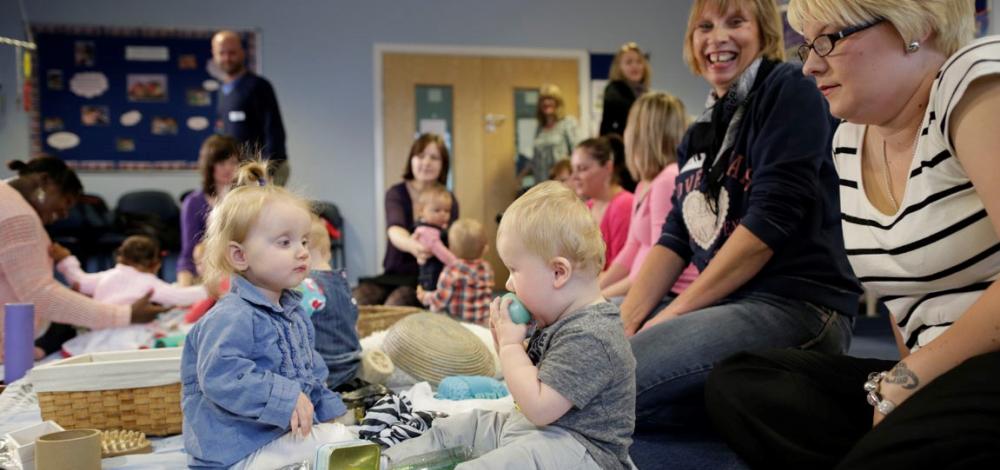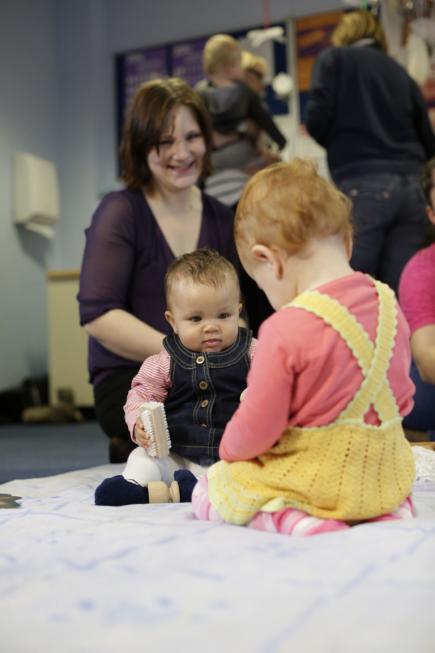peep in child health clinics in oxfordshire
Peep practitioners, working alongside health staff, began to provide an informal Peep session in two child health clinics in Oxford in 2009. These Peep drop-in sessions are known as Early Explorers. The Peep-trained practitioner spends time with families while they are attending the child health clinic or waiting to see a health visitor. They set up a play space on a quilt on the waiting area floor, with treasure baskets and picture books. The practitioner greets all families as they come in, and engages with as many as possible. This includes talking with families about parent-child interaction, child development and ideas to try at home, inviting and encouraging parents/carers to play with their baby or child, and sign-posting families to other local provision.
The Peep-trained practitioner could be someone who already works in the child health clinic such as a nursery nurse, or from elsewhere in the community, such as a children’s centre worker. A follow-on Early Explorers group can also be useful, inviting families who are hesitant or reluctant to access other services.
benefits of partnership work
A two-year research project on Early Explorers, led by Professor Jane Barlow and Chris Coe at the University of Warwick (2009-2011), identified various benefits from this joint working approach. The health and early education/family support elements complement each other. The joint working offers opportunities to get to know families who have not accessed other services. Families can be offered 1:1 support or a place at an Early Explorers group, or be signposted on to other services, as appropriate.
The development of such partnership working between health and the voluntary sector can contribute effectively to delivery of the Healthy Child Programme and similar programmes. It may also help to change public perspectives about the role of child health clinics, from an emphasis on physical well-being to a focus on the development of the ‘social baby’. It enhances the opportunity for early intervention, during the crucial first months of life, to foster parent-baby responsiveness and interaction, leading to positive attachment. For many families these clinics represent a real opportunity to get to know others in a similar situation in their own locality, to develop friendship and support, and thereby to increase social capital, factors that are not only important for healthy families but also for healthy communities.
feedback from parents
Parent attending the clinic drop-in session:
- ‘The first time when I walked in there, there were two other babies and [the Peep Practitioner] was showing them books, baby books and those bottles with shiny stuff in it with glitter and so on. And they were so like very… curious what’s there and so on. So I just went wow that’s really good. I wouldn’t think about that. Because she’s my first child and to be honest with you I didn’t know what to do with her. Like how to play with her and what to show her, how to develop her thinking.. you know...stimulate her brain. I do remember she was quite...crying... and [the Peep Practitioner] showed me the movement, how to calm her down, it was really good, I took a lot from the group and the approach of the staff.’
Parents attending the Early Explorers group:
- During interviews with parents attending an Early Explorers group, nine of the ten said they would not previously have accessed any other group provision. They found the sessions supportive, confidence-building and enabling.
feedback from health visitors
The child health clinic offers a unique opportunity to meet and forge relationships with parents in a non-stigmatising, non-threatening environment, where families already choose to go. Using a universal approach where all families are welcome, vulnerable and unsupported parents can be identified and offered more targeted services.
- ‘More vulnerable families do come to clinic, they are not regular attenders to clinic but they do come, say for a vaccination and that’s when we can direct them to Peep ....and Peep is so approachable and non-threatening that we have actually engaged some of our more difficult and harder to reach families with Peep. So I really think that it’s a harmonious relationship that benefits the mother and child.’ (Health visitor)
- ‘Peep complement our service and I feel we complement Peep’s service. I find when I do clinic that some Mums come just to come to Peep which I think is wonderful and we have been able to introduce parents to the concept of Peep, something that they didn’t know about. Some Mums were unaware of the need to communicate with their baby, even thought they were not verbally communicating back so you know, it’s been a revelation to some Mums, just how important it is to stimulate your baby.’ (Health visitor)


Parent comment on Peep practitioner presence at child health clinic: "Normally it’s just you go and don’t really talk to each other unless you know them anyway. But with Peep there everyone seems to talk to each other. It's more relaxed."
> Read more about the Early Explorers child health clinic study carried out by Professor Jane Barlow and colleagues at the University of Warwick
